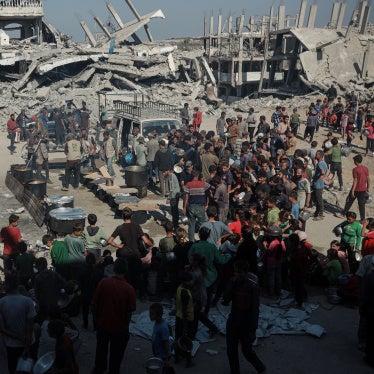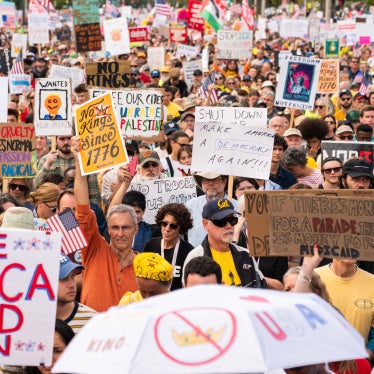Baroness Catherine Ashton
High Representative of the European Union
for Foreign Affairs and Security Policy
Vice-President of the European Commission
200, rue de la Loi
B-1049 Brussels
Brussels, October 18, 2010
Dear High Representative,
I have received your response to my letter of August 11, 2010 regarding the urgent need for a United Nations Commission of Inquiry into recent and ongoing serious violations of international humanitarian and human rights law in Burma. We must admit to disappointment at your apparent lack of interest in strong and timely EU action on this important matter.
We believe you share our assessment that the human rights situation in Burma is dismal. So whatever your concerns and frustration about the lack of progress in response to existing pressures on power holders in Burma, sitting back and hoping that things will change on their own is not a viable strategy. The EU has stated time and time again that combating impunity for war crimes and crimes against humanity is a priority, yet in the case of Burma, this stated "priority" seems to turn into mere rhetoric. The time for adopting UN resolutions merely condemning ongoing crimes in violation of international law in Burma has passed. Now is the time for leadership toward a more effective approach.
We would have expected you, the EU High Representative, to take the lead in discussing the Commission of Inquiry with EU Foreign Ministers for the purpose of pursuing its establishment through the EU-sponsored resolution at this autumn's United Nations General Assembly. We thought you would recognize and join the efforts of courageous Burmese political opposition leaders, civil society activists, ethnic minority groups, monks and students, the current UN Special Rapporteur for Burma and his two predecessors, and a range of countries including many EU member states, the United States, Australia, Canada, and New Zealand in publicly calling for the establishment of an international Commission of Inquiry into war crimes and crimes against humanity by all parties in Burma.
For nearly 20 years, the United Nations has condemned Burma for repeated and consistent human rights violations, with scores of reports documenting widespread and systematic abuse and atrocities committed by the ruling military junta, including government-sanctioned torture and rape, conscription of child soldiers, forced labor, complete censorship of the media, and political repression. Serious crimes have also been perpetrated by non-state armed groups during the more than six-decade long civil war, which contribute to the prevailing climate of impunity. While Burma has been the subject of numerous UN resolutions and reports, it has never been the focus of an international Commission of Inquiry into war crimes and crimes against humanity, nor of any effort to seek accountability for such serious human rights crimes. Now is the time to change that and to let the people of Burma know that the international community has not abandoned them.
In his latest report released on October 18, the UN's Special Rapporteur on the human rights situation in Burma, Thomas Quintana, has expanded and strengthened his call for a Commission of Inquiry. His report says "If the Government fails to assume this responsibility [to investigate crimes against humanity], then the responsibility falls to the international community. In this respect, of particular concern is article 445 of the 2008 Constitution, which may impede the Government from effectively addressing justice and accountability in the future. With the possibility of impunity enshrined in the Constitution, the United Nations can establish a commission of inquiry into crimes against humanity through resolutions adopted by the Human Rights Council, the General Assembly or the Security Council, or the Secretary-General could establish it on his own initiative. Justice and accountability are the very foundation of the United Nations system rooted in the Universal Declaration of Human Rights which calls for an international order in which the rights and freedoms set out in the Declaration can be fully realized. Failing to act on accountability in Myanmar will embolden the perpetrators of international crimes and further postpone long-overdue justice."
An international Commission of Inquiry needs firm EU support, including principled, strategic and high-level EU demarches in capitals around the world. We call on you to provide leadership and coordinate such demarches by yourself, EU member states and other like-minded allies. Experience has shown that when the EU is determined to act on accountability questions at the UN, there are results. It was the EU and it member states that led the efforts to have the UN Security Council first establish a Commission of Inquiry for Darfur, and then refer the situation to the International Criminal Court through a Chapter VII resolution, even though the United States, China, and Russia opposed the move.
With regards to Burma, we are not requesting that the EU and others go through the UN Security Council, but rather that they go through the UN General Assembly, where there are no vetoes to block action. If the EU and its member states are willing to engage in high-level demarches, to divide labor and coordinate strategy, then the international momentum building behind the call for a Commission of Inquiry for Burma will continue to grow and, with enough diplomatic resolve, energy and engagement at the highest levels, come to fruition.
It may be tempting to delay action while "following the upcoming election" in the hopes of some monumental shift in power in Burma, but such a strategy is misinformed. It is important to realize that, while the November election will change Burma's formal governing structure, it will not produce a new government in Burma. The military junta ruled before the election, and it will rule after the election. Opposition to the military's policy is a criminal offense today, and will remain a crime after the election. Burma's economy is in the hands of the military and its business cronies today, and will remain so after the election. The election, in effect, is unlikely to change much. However, a UN-sponsored Commission of Inquiry would send a strong signal to those holding power in Burma and their supporters abroad that continued policies of serious crimes, including war crimes and crimes against humanity, will come at a price, namely further international isolation and individual accountability and justice.
In this way, an international Commission of Inquiry could be a positive move toward bringing about the "concrete results" you seek in Burma. We ask you, as EU High Representative, to take that first step and lead EU efforts to spearhead and facilitate a UN General Assembly resolution. While you certainly cannot advance the adoption of such a resolution on your own, the EU cannot do it without you.
Sincerely yours,
Kenneth Roth
Executive Director
Human Rights Watch
CC:
EU Foreign Ministers
Ambassadors to the EU Political and Security Committee
EU Head of Delegation to the United Nations in New York
EU head of Delegation to the United Nations in Geneva
Mr. Piero Fassino, EU Special Envoy for Burma/Myanmar
Mr. James Morrison, Head of Cabinet
Ms. Renate Nikolay, Advisor to the High Representative
Ms. Alexandra Knapton, Member of Cabinet
Mr. James Moran, Director for Asia, European Commission
Mr. Seamus Gillespie, Head of Unit for Southeast Asia, European Commission
Mr. Rolf Timans, Head of Human Rights Unit, DG External Relations, European Commission
Ms. Veronique Arnault, Director of Multilateral Relations and Human Rights, DG External Relations, European Commission
Mr. Boguslaw Majewski, Head of Asia and Oceana Unit, General Secretariat of the Council
Ms. Riina Kionka, Head of Human Rights Unit, General Secretariat of the Council
Mr. Jerzy Buzek, President of the European Parliament
Ms. Heidi Hautala, Chair of the European Parliament's Subcommittee on Human Rights
Ms. Eva Joly, Chair of the European Parliament's Development Committee
Mr. Gabriele Albertini, Chair of the European Parliament's Foreign Affairs Committee
Mr. Werner Langen, Chair of the European Parliament's Delegation for relations with the countries of South-east Asia and ASEAN





